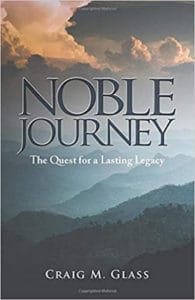Opening:
Excerpt:
Craig Glass: Men are carrying these secrets and these doubts and these regrets that are beneath the surface. And the enemy, who prowls around like a roaring lion looking to see who he can devour, convinces us that we’re defective like nobody else. Hide it. Cover up. Compensate.
End of Excerpt
John Fuller: Well, that’s Craig Glass and he joins us today on Focus on the Family. Your host is Focus president and author, Jim Daly. Thanks for joining us. I’m John Fuller
Jim Daly: Uh, John, I truly think most men, deep in their hearts, want to be good men. Faithful husbands. And involved dads. And I just heard a lot of wives go, “Really?” (Laughter) But far too often we believe that lie that we are frauds. We know what to do, but we don’t do what we know what to do…
John: Mmmm…
Jim: …If that makes sense. We go through feeling like we’re one mistake away from failing everyone around us. And it torments us. Many times, that’s because a man in our life failed us. It’s something we learned. Certainly, that was true of the father figures in my life – my dad, my stepdad, my foster dad. All, um, you know, had tremendous deficits. And you’ve got to cope with that. You gotta figure out am I gonna be that way or am I gonna strive to do something better. Really, in the power of Christ…
John: Yeah.
Jim: …as believers in Jesus, and not in our own strength. We want to talk about that today. I mean, some people have connected with us, John, to say we need to cover men’s’ issues, too. This is one of those days. We’re gonna cover it. And I’d ask wives to stick around because you’re going to learn a lot about how men think today. That might be scary but stick with us. It’ll be good.
John: It will be. Our guest knows what it feels like to be stuck and bogged down. And he’s gonna help us see the truth, that with God we are capable of being the men that we long to be. Craig Glass, as I said at the onset here, is our guest today. He’s the founder of a men’s ministry called Peregrine Ministries and is a husband, dad and grandfather. He’s written a book called Noble Journey: The Quest For A Lasting Legacy. And of course, we have copies of that. Just call 1-800, the letter A and the word FAMILY. Or stop by focusonthefamily.com/broadcast.
Body:
Jim: Craig, welcome to “Focus on the Family.”
Craig: Thank you very much. I’m honored to be here.
Jim: One of the intriguing things about your story is something happened to you when you were a child. It shaped the way you saw yourself as a man. This really goes to the heart of your core message, that shame is the root of so many of the issues we struggle with, as men. Describe what happened and why it affected you so much.
Craig: That’s right. It was about shame. I didn’t know it at the time, and I didn’t know about it for a long, long time. But I was eight years old, and my brother Clyde was three. We were playing in the backyard, digging holes in the dirt, sprinkling it down with a hose, making mud, forming little highways so we could play our Tinker toys on that. And, uh, Clyde was sitting in one of the holes that we dug. And we had some tools and implements there – a shovel, a pitchfork, a rake, a trowel.
Jim: (Laughter) Dangerous toys for an 8-year-old.
John: What could go wrong? (Laughter).
Craig: Just fun toys.
Jim: Yeah, what could go wrong with that?
Craig: What could go wrong? Uh, I decided that I was going to scare Clyde, just tease him, uh, by pretending to stab him with the pitchfork, which seemed like a good idea to me at the time.
Jim: You’d put the fear of you know who in him (laughter).
Craig: Make sure we know who’s boss here. I grabbed the pitchfork. Clyde’s sitting there in the hole. And I raised it over my head, and I brought it down with some kind of a yell. And what I meant to do was drill it into the ground right in front of the hole. And what I did do was drill it into Clyde’s knee. And I pulled the pitchfork back. He, of course, screamed. Blood starts spurting out. I tossed it. And I could not believe what I had just done. Clyde, of course, gets up, starts screaming and starts to run into the house. And immediately, I kick into self-protection mode. The very first thing I said to Clyde was not, “I’m sorry” – “Don’t tell Mom.”
Jim: Right, let’s cover up.
Craig: Cover – cover up.
Jim: Goes all the way back to the Garden of Eden here. Let’s go (laughter).
Craig: Absolutely, the immediate thing is, cover up. Don’t be found out. Don’t tell Mom. The kid’s three years old. He’s hemorrhaging out of the knee. What else is he going to do? Runs into the house and tells mom, and my mother came out. And what followed was just a whole series of awful, immediately implemented lies that didn’t convince anybody, I don’t think. But I – I said, uh, “Clyde jumped in the hole. Something sharp hit him in the knee.” “Really, what hit him in the knee?” “Some kind of sharp cable with wires sticking out.” “Where is it now?” “Oh, uh, I dug it out and – to get rid of it so he won’t be hurt again.” I’m now being the hero in this story. “Where did you put it?” “I buried it behind the – under the bushes back by the alley.” You know, this all happened in 30 seconds.
Jim: (Laughter).
Craig: …Just a terrible series of lies. But ultimately, the truth did not really come out. And I certainly didn’t confess. But Clyde lived with a scar – a triangular shaped scar in his knee – well, he still has it. And I was reminded of it for decades.
Jim: With never uh, reconciling that story over the years…
Craig: Never. I never brought it up again.
Jim: So, I – you know, people are wanting to know the end of that story. It kind of made you feel guilty, I would assume. And then eventually, I mean, I don’t know how many years later, but you tell your mom and dad and Clyde, “OK, I blew it.”
Craig: Yeah. It was 45 years later.
Jim: Forty-five years later.
Craig: Yeah, uh…
Jim: What was their response?
Craig: Well, I..I… I had gone to a men’s retreat, and I learned about shame. And realized I’ve carried shame about this story all of my life. Shame that I’m a defective male, uh, by stabbing my brother and then lying about it. And so, I called Clyde, who lived in Canada by then. And I just said, “Hey, Clyde, I’ve got to bring something up. I don’t even know how to tell you. You know the scar on your knee?” “Yeah.” “I don’t know if you know how it got there. I’m the one that put it there. I punctured your knee with a pitchfork.” And I didn’t know what was gonna come on the other end with his response. It was, “I know. It’s crazy. Wasn’t it?”
Jim: (Laughter).
Craig: That was it.
Jim: “I was there. I remember.”
Craig: “Yeah, I know…”
Jim: “I know. I was 3.”
Craig: But it was no big deal. “It’s crazy, wasn’t it?” And I just couldn’t believe that was all that it was for him. I called my parents, who were in Florida, and I brought it up with them. And their response was, “We don’t know what you’re talking about.” And I reminded them unto (ph) story. “We have no recollection of what you’re describing, Craig.” And it just reminded me of… the enemy loves to pile on shame like weights, rocks in a backpack. Or my picture at the time was this tight-fitting, customized, greasy, hairy fleece that was all mine, a fleece of shame that I was hiding for decades.
Jim: Yeah. Um, and again, that’s a beautiful picture of how the Lord forgives, right?
Craig: And he forgets.
Jim: And he – and forgets, and we need to remember that. But, um, you know, the folks listening, the wife that has always had this little suspicion that her husband isn’t being altogether straightforward…
Craig: Yeah (softly).
Jim: …with her. It’s a gnawing thing. Um, it may not even be – as some people are thinking of your story – yeah, OK, that’s not good that you were playing with pitchforks, but it’s not the end of the world.
Craig: There are worse stories.
Jim: There are worse stories. And there are adult-themed stories where wives are just trying to put pieces together. And part of the problem is they don’t feel that emotional intimacy, and they feel like their husbands are always hiding. And they maybe struggle with the thought that they’re hiding because they don’t want to be shamed.
Craig: Yes.
Jim: You know, so they can’t be honest about their shortcomings, whatever they might be it. Dig into that whole thing. And speak to the wife who’s recognizing that her husband may have some kind of shame, and she doesn’t know what to do with it…
Craig: Sure.
Jim: …and he doesn’t know what to do with it.
Craig: Right. It’s part of why I say in my book, “Men matter. They just don’t think so.” Men do matter. Women matter, too. But men matter in ways that are different from how women matter. We just don’t think so. And I think the primary reason is because of shame. It’s the regrets of what we have done. It’s the hidden secrets of how we treated girls in high school or the abortion we talked to our girlfriend in college into getting, and that’s remained hidden. It’s where we were on the Internet two nights ago before we went to church on Sunday morning. Men are carrying these secrets and these doubts and these regrets that are beneath the surface. And the enemy, who prowls around like a roaring lion looking to see who he can devour, convinces us that we’re defective like nobody else. Hide it. Cover up. Compensate. Nobody must ever find out this story, least of all, my wife. Because what will she do? She’ll think I’ve betrayed her, or she will think less of me. And so, the hiddenness is, just like you said. It’s just like in the garden. The very first thing the first people did was cover up, hide.
Jim: Yeah. The difficulty, though – it’s almost a vicious cycle because that vulnerability requires trust and security. And I would think that sometimes if there’s not a sense that that is there…
John: Hm.
Jim: …I don’t – this isn’t necessarily a male-female thing – but the person who has something to hide…
Craig: Yeah.
Jim: …will be very, uh, reserved about bringing something forward.
Craig: Yes.
Jim: So, let’s just speak to the marital relationship in that regard. How does a wife encourage her husband to not hide in shame, but tell me where you’re at? The irony of ironies with the counseling that we do here at Focus is, so often – it’s true; it can blow things up. But often, what will occur is, uh, for her, a deeper sense of intimacy because now we’re getting to really know each other. That would be the healthy outcome. And we can be, in essence, metaphorically naked in front of each other. And – and God knows us – right? – and now you know me.
Craig: Right.
Jim: And how do I do better in my life in all these areas that you just gave examples for?
Craig: Right.
Jim: So how do you develop that environment where you could begin to develop trust so that you can be vulnerable?
Craig: Yeah. I think it’s a step-by-step process. It’s also, in addition to the marriage relationship, it’s also true that one of the last places men will tell the truth is in church, unfortunately, but that’s just the truth. Why? Because I think I’m going to get condemned and judged. And I believe men feel the same way about their wife. “She’s right, but I’m afraid she’s going to condemn me and judge me. I can’t risk that.” What I believe wives can do is: understand your husband just might be testing the water with his toes just to see how does this go by one thing he might share or reveal. “Hey, that woman who just walked by over there at – at, uh, Burger King, I gotta admit, I was distracted by that. I’m so sorry, hun.” What’s the response? Is it going to be condemnation, or will it be grace? If it’s grace, he’s gonna be willing to say the next thing. And it’s not giving permission. But it is grace – truth and grace, truth and love.
John: Our guest today on Focus on the Family is Craig Glass. And, uh, [I] appreciate his heart. It’s captured so well in the book Noble Journey: The Quest For A Lasting Legacy. We have copies of that. And, uh, we’d invite a donation from you today when you get that book. 800, the letter A and the word FAMILY. Or online we’ll have details at focusonthefamily.com/broadcast.
Jim: Craig, you say that our society needs men to get in the way.
Craig: Yeah.
Jim: In air quotes, “get in the way.” What does that mean?
Craig: It means step up and speak up.
Jim: (Laughter).
Craig: Uh, I’m not the first one to discover this but the first man to me, the quintessential masculine failure is to stay passive and silent. When the first woman needed the first man to say something, do something, he was silent and passive.
Jim: Right.
Craig: All of us would have been much better off if he [had] spoke up and gotten in the way.
Jim: So why do men – why do we lean in that direction toward passivity and quietness?
Craig: Because we’re afraid we’re gonna make a mistake. We’re gonna be a – we’re afraid we’re gonna be wrong. We’re afraid of the reaction. We’re afraid. It’s fear.
Jim: So – so fear, but fear rooted in shame – that if we make the wrong move, we’ll be shamed.
Craig: Yes, and we won’t matter and our identity is compromised; our significance is compromised.
Jim: Where do we get this shame issue? I mean, where – where does that come from?
Craig: It’s from a number of different places, foremost the enemy. Foremost the enemy, who whispers dark secrets and deceit and lies. “That – that pitchfork story, Craig, you’re disqualified. You’re disqualified from ever being a spiritual leader,” for example. It’s the enemy. Uh, our culture I think
communicates shame all the time through commercials, primarily – marketing. “You’re driving that car? Why aren’t you driving this car?” “You’re still wearing that style of jeans? Why aren’t you wearing this?” “You’re using this deodorant?” Over and over again, there’s these messages that essentially say, “You don’t really measure up like the rest of us. Straighten yourself out.”
Jim: Craig, many people, uh, struggle with father wounds. We mentioned that at the opening. I kind of talked about my dad and my stepdad and my foster dad. They all had really bad habits.
Craig: Yeah.
Jim: You know? And there was nothing there that really inspired me to be like them, which is so sad in this culture that – you know, those of us who are dads, don’t you want your sons and daughters to actually mean it when they give you that Father’s Day thing, which hangs on my refrigerator, which is, world’s greatest dad? I just thought this morning, “I want to be buried with that.”
(LAUGHTER)
Jim: ‘Cause I mean, that – I mean, it’s just a cheesy dollar thing. But it’s a magnet that’s on the – and I looked at it today, and I went, “I remember the day that my boys gave me that.” That’s what I want to be. I want to be the world’s greatest dad. And I can have a competitive spirit. I don’t mind that. But, I mean, yeah, let’s aim for that. And then what are the attributes of being the world’s greatest husband, the world’s greatest dad? And let’s get rid of the world and say the greatest biblical dad, the great – you know, how do we fight for those things?
Craig: Yeah, great question. A lot of people – a lot of men that I talked to, when I raise the issue of father wound, they either don’t know what I’m talking about, or they deny that they have one. And the truth is, we all do. That’s my view, is, we all do.
Jim: In part because we’re all gonna fall short.
Craig: That’s right. Every father falls short.
Jim: That’s the nature of this life.
Craig: Every father falls short.
Jim: And it’s OK. The key is knowing it.
Craig: Yes, right. I think, uh, a wonderful example of what boys and daughters needed from a father is – is what Jesus received from his father, both when he was baptized and the mount of transfiguration. And the words are essentially the same in both settings. “This is my son” – acceptance – “whom I love” – affection. “With him I’m well pleased” – affirmation. “Listen to him” – anointing.
Jim: (Laughter) That’s good.
Craig: I love that. That’s what we were built for, to long for from a father. The dad we got, as good as he might have been, didn’t quite measure up to that. That’s the father wound.
Jim: Let me ask you, is there a boundary issue here? Can you – obviously, it’s rhetorical. You can be a really bad dad.
Craig: Sure.
Jim: Can you – can you concentrate so much to be a really good dad that you’re not doing some things well?
Craig: One of the best gifts I was ever given was a man that I respected as a father, he said, “Craig, you’ll never be a perfect dad. Let go of that. But you’ll be a good enough dad.”
Jim: I like that.
Craig: I like that. I can be a good enough dad. I will – I will make mistakes. I know the secrets about me. But I can be a good enough dad.
Jim: Yeah. You shared another story in your book about an ice cream shop…
Craig: Yeah (laughter).
Jim: …And something that happened there.
Craig: You know all the stories.
Jim: Well, I do ‘cause you put them in your book.
(LAUGHTER)
Jim: But what happened at the ice cream shop? I – I think this…
Craig: Yeah.
Jim: In fact, I thought about doing this with one of my sons after I read your book.
Craig: Yeah. Thank you. One of our sons – at the time, he was 11 or 12. My wife and I were noticing, uh, he was seeming – not wanting to go to school, sort of depressed or just sullen. Uh, his grades were dropping. And one day, my wife came to me with the telephone bill with a 900-number charge on it. I don’t even know if there still are 900 numbers, but back then – this is 25 years ago – that meant a pornography or a…
Jim: Phone call, right?
Craig: Yeah, sex…
Jim: Got it.
Craig: …Sex call. And Beryl said, “Do you know anything about this?” And I was relieved to immediately say, “I’ve no idea where that came from” and then caught myself. It’s one of the boys. And so, I was afraid it was this same son. I had no idea what I was going to say to him about any of these things, but we went to Baskin-Robbins. Ice cream helps anything go down. And I just started with, ”Hey, pal. I want to let you know, when I was 12, I was abandoned by two of my best friends who never spoke to me again. I was exposed to pornography in my friend’s garage that was 3 feet high and felt shame about what I was looking a. And I didn’t want to go to school again.” And when I shared that, it gave him – I just saw him respond entirely differently. He opened up and started telling me, “Hey, the 900 number, it was my friend. He was over at our house. He talked me into doing it. I’m so sorry, dad. We didn’t even listen to it. Two of my friends are criticizing me at school because they say I stole other people’s CD’s. I don’t want to show up again, and it’s bothering me.”
Jim: Huh.
Craig: But I was able to get him to tell me the truth by telling my story first, and I – I found a principle that night. Tell your own story first. Start with your story.
John: Mmm.
Craig: And he opened up. And by the way, when we walked out of the ice cream shop, he said, “Dad, it’s good to get this off our chests.”
Jim: (Laughter) Ah, that’s – man to man.
Craig: Yeah, yeah.
Jim: But it is good. And, you know, we mentioned that in the marital relationship. It’s true in the parenting relationship, too…
Craig: Yeah.
Jim: …Where you develop that sense of trust so that your kids can talk with you.
Craig: Absolutely.
Jim: Um, it’s so important. Hey, let’s briefly talk, uh, through the four A’s…
Craig: Hmm.
Jim: …That boys need from their dads. That’s kind of the spine of the book. What are those four A’s?
Craig: Those four A’s – acceptance. This is my son – or my daughter, by the way. Affection – I love her. I love him. Affirmation – I’m proud of him, not just for what he does, but who he is – character qualities…
Jim: Right.
Craig: …Not just behavior. And anointing – listen to him. Watch this.
Jim: So really, what the father in heaven, what you said a moment ago…
Craig: He said all those things.
Jim: …He said to Jesus or about Jesus…
Craig: Yes.
Jim: ….Right? His son.
Craig: Yeah.
Jim: That is so good. Um, Craig, I’m also mindful of the single-parent mom.
Craig: Mmm.
Jim: …And maybe a single parent dad, but certainly a single-parent mom or particularly single-parent mom, where, you know, for whatever reason there’s no father in their child’s life…
Craig: Yes.
Jim: What can she do? What… where can she find that affirmation?
Craig: Yeah.
Jim: …And all the A’s that you’re talking about when she feels like, “I can’t provide those”?
Craig: She’s exceptionally important in the son’s life – no getting around it. She’s the mom. And so, from her, he receives love and affection and so many of the things that all of us children need. What he also needs is for his mom to understand at a certain point – and it might be 12; it might be 16 – that he needs something she can’t give him anymore – still love. She’s still the mom. But he now needs the voice of a man in his life one way or another. Maybe it’s a Boy Scout guy. Maybe it’s a Sunday school teacher, a youth leader, a pastor, a coach, whoever it is, some masculine voice that says, “You’re in.” I’m not the only one to say women can give men many, many wonderful gifts, wonderful gifts. The one thing they can’t give a man is to convince him he’s a man.
John: Mm-hm.
Craig: It’s the voice of a man convinces another man he’s a man.
Jim: (Unintelligible).
Craig: And so, I like to refer to Mary, Jesus’ mother, and Hannah, Samuel’s mother, who both understood, “I need to release my son into the masculine world to learn from older men. I’ll still be the mom, but a man needs to be speaking into his life.”
Jim: In fact, Craig, uh, these things are connected. You had a story in your – in your book, um, about the need for community…
Craig: Yes.
Jim: …How important community is.
Craig: Yes.
Jim: And when we don’t have that, for a variety of reasons…
Craig: Right.
Jim: …It usually puts us in a dangerous situation.
Craig: Yeah.
Jim: Um, you learned about that danger and that issue of isolation during, I think, a time when you were doing some Bible smuggling.
Craig: Yeah.
Jim: So, you can maybe describe what that’s all about and then one of your co-hearts (ph) and what happened to them when they were arrested.
Craig: Yeah, it was, again, one those life-changing experiences for me. Beryl and I were on a team smuggling Bibles behind the Iron Curtain.
Jim: Beryl’s your wife.
Craig: Beryl is my wife.
Jim: Yeah.
Craig: Uh, living in Vienna, Austria – neutral country, but surrounded on the outside by the satellite communist countries. And we went on a regular basis to these countries with vehicles – usually vans, sometimes cars – with hidden compartments, hiding Bibles and pastoral materials. Uh, we did that for four years – unbelievable experience. But one of my best friends was from Finland. His name was Aleks, uh – sharp, solid, spiritually mature, just, uh – the guy who you would want your kids to turn out like. Your sons to turn out like. He went on a trip by himself to the Soviet Union that – at the time – late in December. He had just finished final exams and papers at the University of Vienna. Went late at night, got to the border at the Soviet Union. They took his vehicle, which was a car with a very, very, very secret, hidden, concealed compartment. They tore the whole car apart and found the Bibles…
Jim: Mmm hmm.
Craig: …Hidden in the gas tank.
Jim: Mmm.
Craig: Found 200 Bibles. And then they interrogated him. They kept him for 48 hours, kept him awake, interrogated him, shamed him. “You say your God is a god of love and kindness. You are not being loving and kind to us” – all of those sorts of things.
Jim: Mmm hmm.
Craig: Eventually, he gave up everything he knew. He said everything that he knew. He gave every name away that he knew of those of us back in Vienna, but he knew most of us by code names. The only thing he knew of me was, I was Peter. That’s why we had code names. Eventually, he came back to Vienna, and I had some time with him. And I said, “Aleks, you’re one of the strongest physical, mental, and spiritual men I know. How did they break you?” He said “Easy – three things. I was tired, I was confused, and I was alone. That’s all it took to break me.” And I know that that’s true for us men. We are tired. We’re exhausted. What we need is encouragement. We’re confused much of the time. How do we respond to our 16-year-old daughters? How do we respond to the boss who’s trying to tell us to cut the corners? We need clarity from Scripture, and many of us feel alone – not lonely, necessarily, but isolated.
Jim: Yeah.
Craig: And we need community. That’s where we need community from other men who remind us who we are and what we believe.
Jim: Well, and I think you’ve described very well the – the complicating factors of being a man today. But right here at the end, let’s ask you to remind each of us, what is that given purpose and value that men bring?
Craig: Yeah. Um, I have to say, women matter, too. Women matter just as much as men do. But I work with men, and I know what it feels like to be a guy. We need to overcome the lie of shame. And we need to understand that by God’s design – and we read it in Scripture. We men reflect the masculine nature of how God presented himself, and especially Jesus told the story of the prodigal son father.
Jim: Mmm.
Craig: I want to be that guy. And we reflect the example that Jesus gave of what it looks like to be a man – compassionate and confident…
Jim: Mmm.
Craig: …Kind to women, leader of men.
Jim: Yeah.
Craig: That’s what we’re called to be. We follow those examples.
Jim: Well, that’s a great summary of what we’ve talked about today – pretty wide-ranging. But this is it. This is, you know, the great issue of men.
Craig: Yeah.
Jim: …That idea of shame and how we overcome that and conquer, in a healthy way, the spiritual, emotional issues that we face…
Craig: Yeah.
Jim: …In ourselves and in our family, and it’s a great call to action. Uh, Craig, your story has been powerful. Your observations have been equally powerful. Thank you for being with us today.
Craig: It’s a pleasure to be with you.
Closing:
John: And we’ll encourage you to get in touch if we can be of any service. Um, it may be that we’ve opened up a wound. We’ve addressed a shortcoming that you feel desperately needs to be talked about, but you don’t know where to turn. We have caring Christian counselors here on staff, and it would be a privilege for us to talk with you. Our number is 800, the letter A and the word FAMILY. Certainly, online, we have a find-a-counselor tool, and we have Craig’s book, Noble Journey: The Quest For A Lasting Legacy, and, uh, other resources as well. focusonthefmaily.com/broadcast.
Jim: John, let me remind the listeners, if you can provide a donation of any amount to help us in the ministry here at Focus on the Family, we’ll send you a copy of Craig’s book, Noble Journey, as our way of saying thank you, and that may be a monthly gift or one-time gift. Either way, we’ll do that to recognize your partnership with us.
John: Yeah. Your financial contributions really make a big difference in, uh – in how we go about our work providing resources to families around the world. So please give generously today as you can. Our number again – 800, the letter A and the word FAMILY.
John: And coming up next time, what do you do when your marriage turns hopeless?
Teaser:
Jeremy Lee: It drove me to just sort of, when I pulled away to myself, that I just felt like, wait a second. I’m not happy. This marriage is not happy. You know, at some point, we … I’m better off not being here.
End of Teaser























